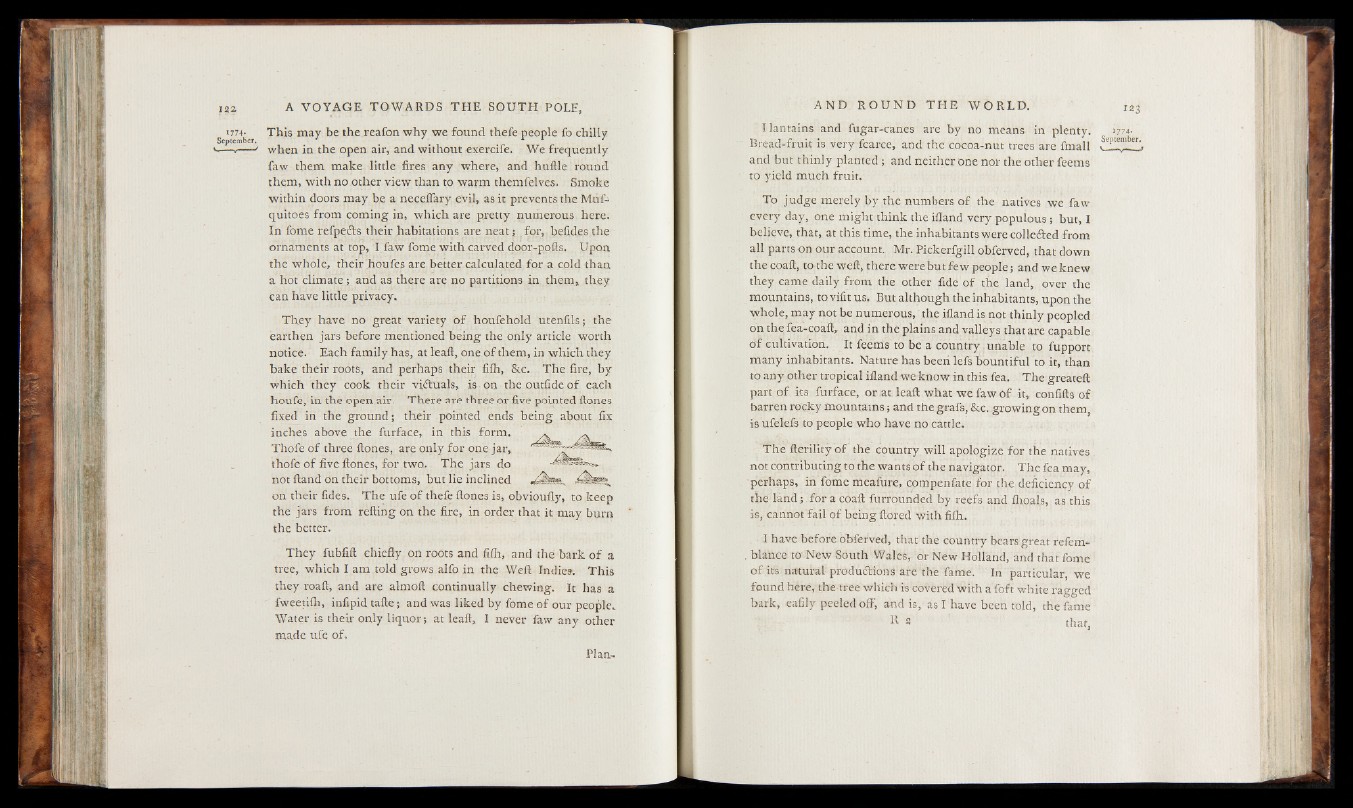
1774- This may be the reafon why we found thefe people fo chilly
-— l--- ' when in the open air, and without exercife. We frequently
faw them make little fires any where, and huftle round
them, with no other view than to warm themfelves. Smoke
within doors may be a neceflary evil, as it prevents the Muf-
quitoes from coming in, which are pretty numerous here.
In fome refpeCts their habitations are neat; . for, bcfid.es the
ornaments at top, I faw fome with carved door-pofts. Upon
the whole, their houfes are better calculated for a cold than
a hot c lima teand as there are no partitions in them, they
Can have little privacy.
They have no great variety of houfehold utenfils ; the
earthen jars before mentioned being the only article worth
notice. Each family has, at leaft, one of them, in which they
bake their roots, and perhaps their fifh, &c. The fire, by
which they cook their victuals, is on the outfide of each
houfe, in the open air. There are three or five pointed ftones
fixed in the ground; their pointed ends being about fix
inches above the furface, in this form.
Thofe of three ftones, are only for one jar,
thofe of five ftones, for two. The jars do
not ftand on their bottoms, but lie inclined
on their fides. The ufe of thefe ftones is, obvioufly, to keep
the jars from refting on the fire, in order that it may bum
the better.
They fubfift chiefly on roots and fifh, and the bark of a
tree, which I am told grows alfo in the Weft Indies. This
they roaft, and are almoft continually chewing. It has a
fweetifh, infipid tafte; and was liked by fome of our people.
Water is their only liquor ■, at leaft, I never faw any other
made ufe of.
Plan-
Ilantains and fugar-canes are by no means in plenty. 1774.
Bread-fruit is very fcarce, and the cocoa-nut trees are fmall ,September'.
and but thinly planted ; and neither one nor the other feems
to yield much fruit. . ■ , To judge merely by the numbers of the natives we faw
every day, one might think the ifland very populous ; but, I
believe, that, at this time, the inhabitants were collected from
all parts on our account. Mr. Pickerfgill obferved, that down
the coaft, to the weft, there were but few people; and weknew
they came daily from the other fide of the land, over the
mountains, tovifitus. But although the inhabitants, upon the
whole, may not be numerous, the ifland is not thinly peopled
on thefea-coaft,. and in the plains and valleys that are capable
of cultivation. It feems to be a country unable to fupport
many inhabitants. Nature has been lefs bountiful to it, than
to any other tropical ifland we know in this fea. The greateft
part of its furface, or at leaft what we faw of it, confifts of
barren rocky mountains; and the grafs, &c. growing on them,
is ufelefs to people who have no cattle.
The fterility of the country will apologize for the natives
not contributing to the wants of the navigator. The fea may,
perhaps, in fome meafure, compenfate for the deficiency of
the land; for a coaft furrounded by reefs and flioals, as this
is, cannot fail of being ftored with fifh. I 1
I have before obferved, that the country bears great refem-
blance to New South Wales, or New Holland, and that fome
of its natural productions are the fame. In particular, we
found here, the-tree which is covered with a foft white ragged
bark, eafily peeled off, and is, as I have been told, the fame
11 3 . ' that,